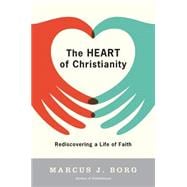World-renowned Jesus scholar Marcus J. Borg shows how we can live passionately as Christians in today's world by practicing the vital elements of Christian faith.
For the millions of people who have turned away from many traditional beliefs about God, Jesus, and the Bible, but still long for a relevant, nourishing faith, Borg shows why the Christian life can remain a transforming relationship with God. Emphasizing the critical role of daily practice in living the Christian life, he explores how prayer, worship, Sabbath, pilgrimage, and more can be experienced as authentically life-giving practices.
Borg reclaims terms and ideas once thought to be the sole province of evangelicals and fundamentalists: he shows that terms such as "born again" have real meaning for all Christians; that the "Kingdom of God" is not a bulwark against secularism but is a means of transforming society into a world that values justice and love; and that the Christian life is essentially about opening one's heart to God and to others.
“Highly readable a valuable glimpse into the essence of Christianity Borg writes with clarity and precision.”-Publishers Weekly
“A winsome, accessible, pastoral offering Borg provides a way for an important, positive, and serious rethinking of the gospel.”-Walter Brueggemann, Christian Century
“Marcus Borg brings expert knowledge, insight, and warmth to this revisiting of Christianity’s heart and soul. He makes absolute sense.”-Thomas Moore, author of Care of the Soul and The Soul's Religion








